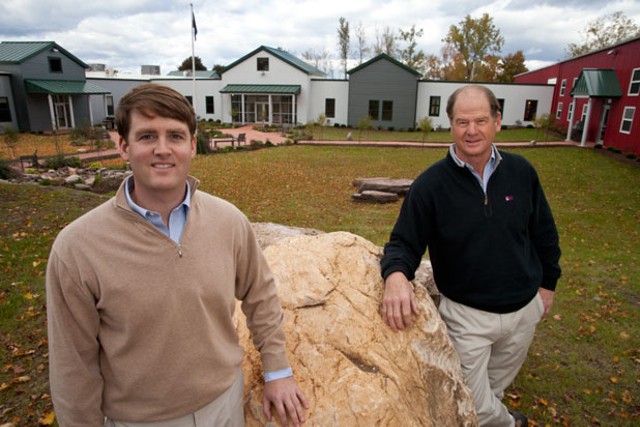Published October 17, 2012 at 9:13 a.m.
On a sweltering afternoon last June, Gov. Peter Shumlin took the mic behind the new EatingWell Media Group offices in Shelburne, and the small crowd stopped sipping glasses of local wine and spirits to listen. After the governor cut a ceremonial ribbon, he congratulated the EatingWell crew on the move from their longtime home in Charlotte to their gorgeous new digs. “To me, EatingWell represents telling a story of how we can do better, how food matters,” Shumlin said.
He might as well have been describing the vision of a couple of people in the crowd that day — namely, J. Graham Goldsmith Sr. and Jr., the father-and-son pair who had purchased the 22-acre property the previous year and given it a face-lift. With a brand-new, LEED-certified building — including a dark-red, aluminum warehouse shell and a partially “edible” courtyard dotted with herbs and blueberry plants — the site gave no hint of what had stood there for decades: Shelburne Industries, the longtime enterprise of former governor Richard Snelling.
Drivers passing along Route 7 between Shelburne Vineyard to the west and Fiddlehead Brewing to the east may not have noticed the yearlong construction project, which commenced in May 2011. But the Goldsmiths’ $1.65 million purchase of this former industrial and office complex — whose warehouse once turned out thousands of brass coffee-cup rings — jump-started an ambitious venture that could bring more traffic to Shelburne’s evolving culinary corridor. EatingWell, which moved in last February to anchor the complex, was only its first tenant.
The Goldsmiths’ company, White Cap Ventures LLC, has so far poured $3.5 million into renovations, tearing down the ceilings and walls to transform a fusty 73,000-square-foot space into an environmental showcase that they hope will attract like-minded businesses. The Goldsmiths’ vision for the complex, now called Shelburne Green, includes a food hub; initially, there had been talk of aggregating a miller, baker and other food producers in one space.
Macy Mullican, the wiry, dynamic Shelburne Vineyard project manager, who has worked in and around Vermont agriculture for 20 years, has made it her mission to find those food-related businesses and connect them with the Goldsmiths. “The idea is to have a mix of production and retail,” Mullican explained to Seven Days a few months ago. “People can walk in and see someone making a few bars of chocolate, or milling some grain. It will be a center of education, retail and production that supports the food movement in Vermont.
Yet filling the building has happened slowly, even with the developers eager to build out for prospective tenants. Despite the presence of EatingWell and another early office tenant, Global Maritime Transportation Services, the manufacturing “shell” out back remained empty for months. That wait tied the hands of Goldsmith Jr., who needed a critical mass of tenants before he could draw up architectural plans for individual spaces. (White Cap has priced office space in Shelburne Green at $13 per square foot, while production space is $8.50 per square foot.)
“We hope to create a place for [the food businesses] to come together and work together, and we want to help guide the vision into a culinary center and food innovation center,” says Goldsmith Jr., who has undertaken myriad renovations around the area, including revamping the old Rossignol building in Williston into White Cap Business Park.
“It’s a huge puzzle, and you need to piece it together,” adds Mullican of the Shelburne project.
Though it comes with the best intentions and the exciting prospect of establishing a food hub in the state’s most populous county, the project has faced a basic challenge. “In the Chittenden County area, we have a surplus of retail and commercial space, something like a three-year inventory of office space,” says Dean Pierce, Shelburne’s town planner, citing stats from an Allen & Brooks Associates report. “Based on the success [the Goldsmiths] have had, they thought they had something unique, in a sense, that was market defying and would be appealing to people who might want to be near Burlington,” Pierce adds.
For EatingWell’s general manager, Larry Sommers, the move to Shelburne Green was a no-brainer. After the Meredith Corporation purchased the company last year, EatingWell needed an updated, more accessible space than its bucolic offices in Charlotte. The Goldsmiths obliged with a 10,515-square-foot, mostly open-plan office with a custom-built test kitchen and video and photo studios.
“We’re more efficient; we’re a little more creative, which at the bottom line provides a better product,” Sommers says. “People want employees to be happier and healthier. There’s no doubt that the physical space affects that and helps the generation of ideas.”
The Goldsmiths say they want to offer other incoming tenants the same benefits — and the company of fellow food-related businesses. But, until last week, they had only signed three tenants.
Charlotte’s Teeny Tiny Spice Co. of Vermont was the first to sign on for production space, but has yet to move into its new, 1000-square-foot manufacturing digs. “We were outgrowing our space when we heard about this one from Macy [Mullican],” says Thora Pomicter, who owns the two-year-old spice company with her husband, Ed. “I was hoping we’d be in a few months ago,” she admits.
She may not have to wait much longer. In recent weeks, Shelburne Green’s fortunes seem to have shifted. Last week, Sunward Solar, a producer of solar-powered hot-water systems, committed to moving into the manufacturing space. “The good news is that it gives me the tenant I need to start building out the hallways, the floors and the bathrooms,” says Goldsmith Jr., who has courted a toy company, a milk producer, a chocolate maker and a café over recent months. He is also negotiating lease terms with Vermont Farm Table, which will manufacture onsite.
The sluggish start doesn’t faze Yves Bradley, who is one of two Pomerleau Real Estate agents for the building. “When a new building comes on line and it’s empty, it’s like a bunch of kids standing on the edge of a cliff overlooking the river. It’s like, I’ll jump, but you gotta jump first,” he says.
It was the same way with the Rossignol building, which the Goldsmiths renovated a few years ago. “At first people were like, ‘Nice building, but not sure about it.’ Now it’s full,” Goldsmith Jr. points out.
At Shelburne Green, Bradley thinks the tipping point has been reached. With two signature tenants, “All of a sudden we have a fair amount of interest,” he says. “It’s a great fit for people who don’t necessarily want to deal with the greater Burlington area and who prefer a more pastoral setting … [The Goldsmiths] have created a beautiful and tranquil place to do business.”
Nearby, Fiddlehead Brewing, itself barely a year old, serves as a buffer between the road and Shelburne Green, and its traffic offers a preview of what a food hub might generate. Owner and head brewer Matt Cohen says a steady stream of customers stop in at his tasting room each day, and he reckons that number will only grow — especially as the space behind him fills up.
“It could potentially be more of a destination,” says Cohen, who is about to tap his Oktoberfest beer. “Between us and the winery [Shelburne Vineyard], there’s this vibe going on down here in the south end of Shelburne. It’s starting to pick up, and people are starting to migrate toward this end of town. Before, there wasn’t much going on here.”
Sommers says EatingWell chose Shelburne Green primarily for its proximity to Burlington and the highway, not because of the developers’ plan to make it a food destination. But that’s a definite bonus.
“We think the food hub is an exciting concept. And the fact that we’re next to a brewery and a winery is not shabby,” Sommers says. “I’m looking forward to new people coming into the
More By This Author
About the Artist

Matthew Thorsen
Bio:
Matthew Thorsen was a photographer for Seven Days 1995-2018. Read all about his life and work here.
Matthew Thorsen was a photographer for Seven Days 1995-2018. Read all about his life and work here.
Speaking of...
-

Q&A: Howard Fisher Delivers Meals on Wheels With a Side of Good Cheer
Dec 20, 2023 -

Video: Howard Fisher Delivers Meals on Wheels
Dec 14, 2023 -

Q&A: Alexis Dexter Rescued 57 Shelter Cats During the July Flood
Sep 13, 2023 -

Video: Two Months After the Flood, Alexis Dexter Rebuilds Kitty Korner Café in Barre and Continues to Rescue Cats
Sep 7, 2023 -

Video: Saying Goodbye to Burlington’s Penny Cluse Café
Nov 17, 2022 - More »
Comments
Comments are closed.
From 2014-2020, Seven Days allowed readers to comment on all stories posted on our website. While we've appreciated the suggestions and insights, right now Seven Days is prioritizing our core mission — producing high-quality, responsible local journalism — over moderating online debates between readers.
To criticize, correct or praise our reporting, please send us a letter to the editor or send us a tip. We’ll check it out and report the results.
Online comments may return when we have better tech tools for managing them. Thanks for reading.














































